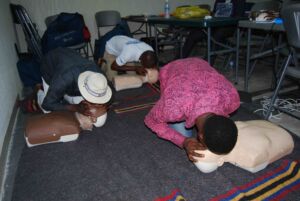
Medicare
Advance Courses
|
5 days
|
English
|
OnsiteDescription
Medicare is a federal health insurance program in the United States primarily for individuals aged 65 and older, though it also covers some younger people with disabilities and individuals with End-Stage Renal Disease (ESRD). The program is administered by the Centers for Medicare & Medicaid Services (CMS).
Course Curriculum
- Medicare Part A (Hospital Insurance)
- Covers inpatient hospital stays, care in a skilled nursing facility, hospice care, and some home health care.
- Most people do not pay a premium for Part A if they or their spouse paid Medicare taxes while working.
- Medicare Part B (Medical Insurance)
- Covers certain doctors’ services, outpatient care, medical supplies, and preventive services.
- Requires a monthly premium, which can vary based on income.
- Medicare Part C (Medicare Advantage Plans)
- An alternative to Original Medicare (Parts A and B) offered by private companies approved by Medicare.
- Provides all Part A and Part B benefits and usually includes Part D (prescription drug coverage).
- Often offers additional benefits like vision, hearing, dental, and wellness programs.
- Medicare Part D (Prescription Drug Coverage)
- Provides prescription drug coverage through Medicare-approved private insurers.
- Requires a monthly premium, which varies by plan and income.
- Helps lower the cost of prescription drugs and protect against higher costs in the future.
Enrollment
- Initial Enrollment Period (IEP): Starts three months before the month you turn 65 and ends three months after the month you turn 65.
- General Enrollment Period (GEP): January 1 to March 31 each year for those who did not sign up when first eligible.
- Special Enrollment Period (SEP): Available for individuals who qualify under special circumstances, such as losing other health coverage.
Costs
- Premiums: Vary based on the part of Medicare and income level.
- Deductibles and Copayments: Beneficiaries are responsible for certain out-of-pocket costs, which vary by plan.
- Late Enrollment Penalties: May apply for not enrolling in Parts B or D when first eligible without having other credible coverage.
Importance
- Healthcare Access: Ensures that senior citizens and eligible individuals with disabilities have access to necessary medical care.
- Financial Protection: Helps protect against high medical costs and provides financial stability in accessing healthcare.
- Comprehensive Coverage: Offers a wide range of medical services, from hospital stays to preventive services, helping to maintain overall health and well-being.
Medicare is a vital program providing health insurance to millions of Americans, ensuring they receive necessary medical care while managing healthcare costs. It is crucial for eligible individuals to understand their options, enroll on time, and select the best coverage to meet their healthcare needs.
- Category Advance Courses
- Language English
- Duration 5 days
- Level Advanced
- Assessments Yes
Reviews
4.5
Limited Time Offer